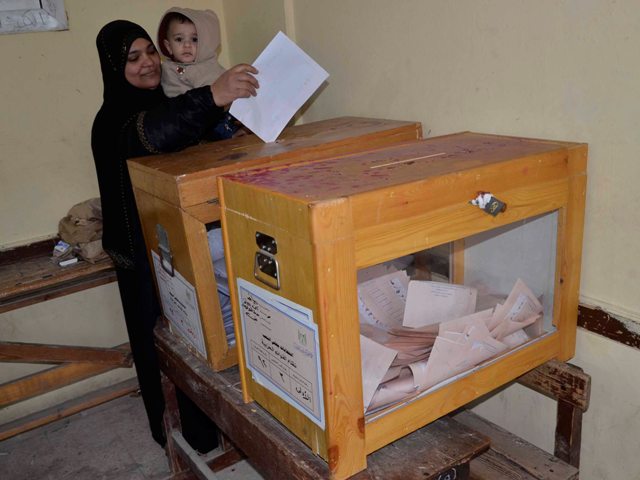
MONUFIYA — Monufiya is the birthplace of former President Hosni Mubarak, and for years steel magnate Ahmed Ezz and Kamal al-Shazly, former members of the now-dissolved National Democratic Party, dominated two of its constituencies.
With the NDP stalwarts out of the picture — Shazly died last year and Ezz is in prison — Islamists seem to have the upper hand in the agricultural governorate's electoral race.
Ten parties and more than 200 single-winner candidates are competing for Monufiya’s 16 list-based seats and eight single-winner seats. The competition is fiercest between the Muslim Brotherhood’s Freedom and Justice Party (FJP), the Salafi-led Nour Party, Wafd Party and Wasat Party.
FJP is fielding candidates for all of the party list seats and half of the single-winner seats.
“We genuinely don’t want to be the sweeping majority in the parliament,” Sabry Amer, the top candidate on the FJP list in Monufiya's first constituency, told Egypt Independent.
“[The] ABC of politics say we shouldn’t compete for all seats so that we don’t make enemies with all parties,” said the recently-elected chairman of the Engineer's Syndicate.
“We are not coordinating with Salafis in any way at the moment,” said Amer, who added that the FJP focuses on three main campaign activities: candidate-led rallies and cars with megaphones, popular conferences and most importantly, knocking on doors.
Both the Nour Party and the FJP have targeted the Wasat Party campaigns, according to Ahmed al-Dib, Wasat Party’s Shura Council candidate.
“Although we are fewer in number and [have less] financial resources, Nour supporters have torn down our street banners while propagating that Wasat is a liberal and secular party that doesn’t follow Islamic Sharia law,” said Dib.
Dib added that FJP campaigners also intercepted a Wasat candidate’s rally last week and forced the party’s car out of Mai village.
Wasat candidates have promoted the party’s image as the religiously moderate alternative to FJP and Nour. They sent text messages to voters, encouraging them to choose the party’s election symbol, the lamp.
“We represent the moderate alternative to those who want to apply Sharia without infringing on personal freedoms. It’s not the state’s role to enforce good manners or the police’s role to chase unveiled women,” said Dib.
Despite the media scare from Islamists' domination after they won about two-thirds of seats in the first round, voters supporting FJP and Nour in Shibin al-Kom don’t seem to be affected — especially regarding fears of restrictions on Western tourism and minority rights.
“I don’t believe these allegations about Islamists because they can’t single-handedly control and destroy such a vital sector of our economy. And if they did, Tahrir Square is here for us,” said Samira Nabawy, a government employee.
“If we don't like them, we will simply not vote for them again in following elections. The old regime when candidates would hold their seats for a lifetime is gone, now we have the freedom to choose and reject whoever we want.”
“I hope we give the Muslim Brotherhood the chance to see what they can do for the country after they have been oppressed for years. I feel that being religious, they won’t be corrupted by power,” said Radwa Essam, 22, a medical student at Monufiya University.
The liberal party coalition, the Egyptian Bloc, suffered a blow last week when it withdrew Sami Fattouh Moussa, its top list-based candidate, after finding out that he is a former NDP member who worked against the revolution, according to a statement the bloc published on its website.
The three-party alliance is supported mainly by Monufiya’s Christian community.
“Elections in Egypt are distorted. Muslims agree to vote for a certain party or candidate and Christians do the same,” said Akram Awadallah Salib, 48, a hairdresser who said she plans to vote for the Egyptian Bloc.
He doesn't fear Islamists, he said, but he rejects the idea of any single force dominating power.
In addition, a number of former NDP members are running on single-winner seats and on party lists.
Helmy Sayyed, a doorman, said he plans to vote for Shafik al-Banna, a former secretary of Mubarak, because they are related, but said he would generally not vote for former NDP members.
“God burn them [former NDP members] all in hell, along with their president. They were a bunch of corrupt, self-interested people. I don’t trust them anymore, they are all thieves,” said Sayyed.
Candidates associated with revolutionary groups such as Kefaya and the Revolution Continues Coalition seem to be unknown to voters.
“I have very weak financial resources. I rely mainly on my popularity from protests and sit-ins during the revolution,” said Mamdouh al-Nezamy, coordinator of the Kefaya movement in Monufiya.
Nezamy is running for the labor single-winner seat in the first constituency against a strong FJP candidate, Saad Hussein.
Amid the campaign hype, the April 6 Youth Movement decided to boycott the elections in protest of the recent violence in downtown Cairo, where clashes between security forces and protesters left at least 45 people dead.
Mohamed Kamel, the April 6 Youth Movement coordinator in Monufiya, called on people to boycott the polls, saying that if they are afraid of being fined LE500 for not voting, they can void their ballots by writing “down with the elections.”




